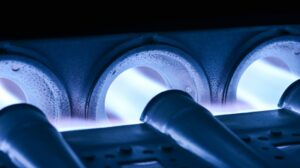Natural gas is a common energy source for homes to power stoves, ovens, water heaters, drying machines, boilers, and furnaces. That it’s so common across the country will tell you that using natural gas in your home is safe. If you use a natural gas furnace to heat your home—and it’s the most common type of heater in the US—you can feel comfortable that you don’t have a dangerous object, some kind of ticking time bomb, in the house.
That’s the basic answer to the question, “Is a gas furnace safe for your home?” It’s not the full answer, because no natural gas appliance can be 100% safe all the time. Any furnace requires regular maintenance as well as targeted furnace repair in Perry, GA when needed. We’ll explain the ways a furnace might become unsafe and what you can do to prevent it.
How Can a Gas Furnace Become Unsafe?
Gas Leaks
A leak in the gas line or connections inside your furnace can release natural gas into your home. Natural gas leaks are dangerous because they can lead to fires, explosions, or carbon monoxide buildup. It’s important to have leaks repaired quickly by a licensed professional.
Carbon Monoxide Leaks
Carbon monoxide (CO) is an odorless, colorless gas that can become deadly if inhaled in large amounts. If your furnace’s heat exchanger cracks or if the ventilation system is clogged, CO can leak into your home. This is why every home with gas appliances should have carbon monoxide detectors installed.
Faulty Pilot Light or Ignition System
A faulty pilot light or ignition system could cause gas to build up inside the furnace, posing a fire risk. In some cases, a malfunctioning ignition system can also prevent the furnace from operating, leaving you without heat when you need it most.
Blocked or Dirty Flue
The furnace’s flue pipe vents combustion gases safely outdoors. If the flue becomes blocked or damaged, those gases—including carbon monoxide—can be pushed back into your home.
Delayed Repairs or Lack of Maintenance
A gas furnace that doesn’t receive regular maintenance is more likely to develop problems over time. Worn-out parts, dirty burners, or malfunctioning safety switches can compromise both the performance and safety of the furnace.
How to Keep Your Gas Furnace Safe
The good news is that with routine care and professional assistance, you can keep your gas furnace operating safely and efficiently. Here are the steps to follow:
Schedule Annual Maintenance
The most important thing you can do is schedule a professional furnace tune-up every year before winter begins. During maintenance, our technicians will inspect the entire system, clean essential components, and test for potential safety issues.
Install Carbon Monoxide Detectors
Every home with a gas furnace should have carbon monoxide detectors installed on every floor, especially near bedrooms. Test these detectors regularly to make sure they’re functioning correctly.
Address Repairs Promptly
If you notice any unusual behavior from your furnace—such as strange smells, loud noises, or difficulty starting—call us right away. Delaying repairs can lead to bigger problems, including safety risks like gas leaks.
Watch for Signs of Trouble
Be aware of warning signs that indicate potential safety hazards. If you smell gas, hear frequent cycling, or suspect your furnace isn’t venting properly, turn off the furnace immediately and contact a professional.
Contact us today to schedule your annual maintenance or repair service. We’ll make sure your furnace is working efficiently and safely so you can enjoy peace of mind all winter long.


